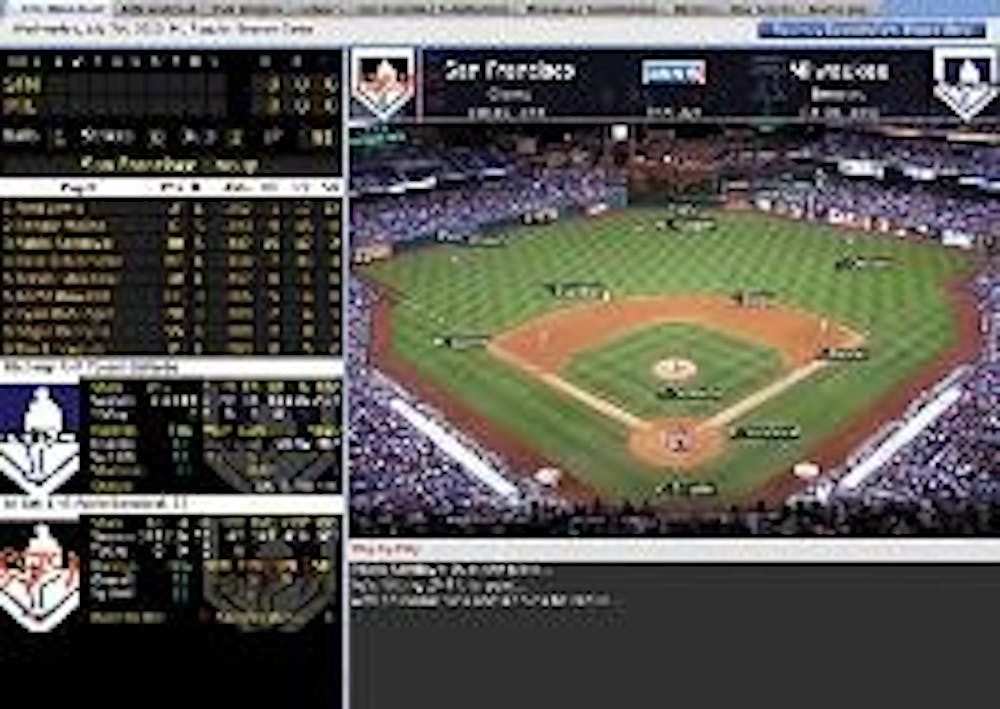Out of the Park Baseball 11 complex but addictive

Beneath OOTP's complex exterior and steep learning curve is an infinitely deep and addictive baseball experience.
Out of the Park Baseball 11 is the Rice University of baseball video games. It's geeky and obsessed with statistics, and it lets you do nearly everything short of taking a swing yourself. OOTP 11 is a simulation game that puts the player in the position of general manager of a baseball team. As GM, you do not step into the batter's box and swing for the fences. Instead, the game focuses on managing the team, negotiating trades, promoting minor leaguers and building a playoff dynasty.
Beginners will most likely find OOTP 11's multitude of options overwhelming. Tooltips are unreliable, so gamers may be puzzled unless they click on those buttons. And there are an incredible number of tasks to carry out, from promoting and demoting players, to setting the pitching rotation, to deciding ticket prices, to negotiating with amateur draft picks. The game has video tutorials and a helpful manual, but learning how to grasp all the options at hand still takes a lot of time.
I started two games in OOTP 11, taking advantage of the simulation's versatility. In the first game, I created a fictional league, League Canada, and became GM of the Vancouver Canucks. The league creation wizard allowed me all sorts of room for creativity, from team names and locations to the percentage of foreign players.
OOTP automatically generated an entire database of fictional players, including full minor-league systems for every team. Every player in the system has ratings for individual skills, ranging from defense and power hitting to endurance and even loyalty to his team. Luckily, my Canucks had some of the league's biggest superstars, including an outfielder nicknamed "Kicks."
But I was not content just to watch the team play. Before the season began, I conducted numerous trades and signed a free-agent third baseman and a hotshot young starting pitcher. When I traded away a star player for minor-league prospects, fans started grumbling about my performance.
Luckily, the grumbling stopped during the regular season, after my team got off to a 15-2 start. But success does not mean less work: Other teams constantly offer trades, scouts report on the progress of minor leaguers and players often get injured. In fact, my players got hurt a little too often in OOTP, even in spring training, so I just turned the injury rate down to a lower level on the game options menu.
In my second game, I played as this season's actual Milwaukee Brewers. OOTP 11 put me in charge of the Brew Crew starting April 3, with the team's real opening day roster. Before the first game, I signed a deal with Pedro Martinez to join the Brewers' starting rotation. Then I settled down and discovered that, well, the Brewers are really not that great of a team.
Running a mediocre team might be the best way to appreciate the realism of the game. I had to deal with an injury to Ryan Braun, an angry owner complaining about my performance and the harsh reality of being unable to trade away overpaid veterans. Eventually I had to launch the Brew Crew into full rebuilding mode, trading away almost half of the roster in exchange for prospects like Blue Jays minor leaguer Kyle Drabek and Astros Jason Castro and Bud Norris. The next few seasons should be fine (in OOTP you can theoretically manage a team forever), but my 2010 Brewers are on the road to 100 losses.
There are a few bugs to be worked out in the game, with some clicks accidentally taking you to the wrong pages. I would like to see the artificial intelligence general managers have personalities, too, to indicate the kinds of players they like best. But, for a text-based simulator of the team management experience, Out of the Park Baseball 11 cannot be beat. If real general managers can do it, so can you.
Indeed, OOTP's biggest weakness is the overwhelming feeling a beginner faces looking at all of the possibilities. Well, that and the fact that the game is ridiculously addictive. Thanks to OOTP 11, my time-management skills have gone down the tubes.
One final note: OOTP's powerful simulation software can attempt to predict the actual results of baseball seasons. I ran the year 2010 in hands-off mode three times, watching the real major league teams play simulated seasons. The three simulated World Series champions were the Boston Red Sox, the St. Louis Cardinals and, weirdly, the Kansas City Royals, behind career years from Gil Meche and Billy Butler.
In OOTP 11, then, anything can happen, just like in the real major leagues. Now about those Cubs and their 102-year drought ... think you've got what it takes to reverse the Curse of the Billy Goat?
More from The Rice Thresher

Startup incubator unveiled in Ion District
The Rice Nexus in the Ion building was opened to the public Feb. 14. The Nexus will assist selected faculty, student and alumni startups with office space and industry mentorship, free of charge.

Rice testifies for lawsuit against ‘devastating’ federal funding cuts
Rice joined 70 other universities supporting a lawsuit against the National Institutes of Health, which may reduce research funding by billions of dollars. A Feb. 7 NIH memo announced a drastic cut to indirect costs, which covers overhead for research institutions; including funding for lab spaces, water and power bills and paying subcontractors, according to testimony from Provost Amy Ditmtar.

‘Collateral damage’: Houston’s top horn musician allegedly harassed Rice students for decades. And the school knew.
Rice University’s famed horn professor William VerMeulen abruptly retired last spring amid a swirl of sexual misconduct allegations. But dozens of students and industry insiders say “the administration has known for 30 years” — and failed to act.

Please note All comments are eligible for publication by The Rice Thresher.